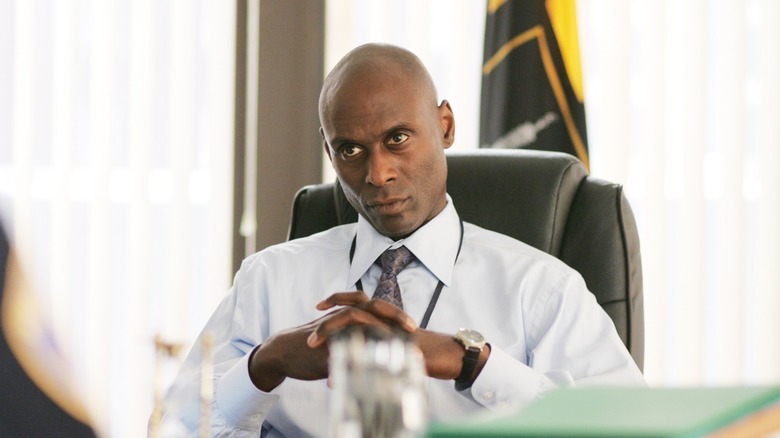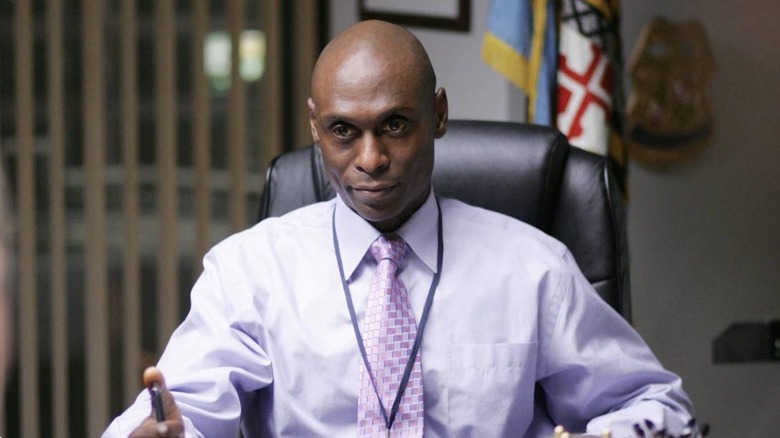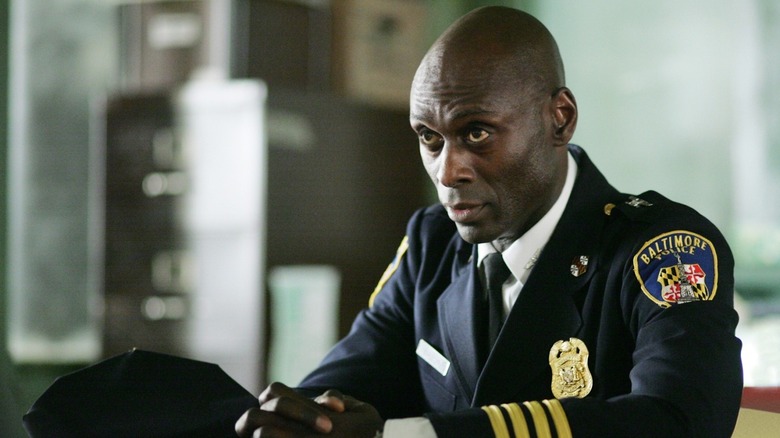Lance Reddick Wasn't The Flashiest Part Of The Wire, But He Was Its Moral Center
The world lost one hell of an actor when Lance Reddick passed away at the age of 60 from natural causes on March 17, 2023. The news hit the entertainment industry with pulverizing force, given that Reddick had been doing press for "John Wick: Chapter 4" throughout the week. But his death was especially difficult to comprehend because he cut such a powerful figure in every role. Reddick was in full stride as a character actor, as vital an onscreen force as there was in film and television. This is a profoundly cruel loss.
Reddick was so wonderful in so many things that, as a critic, you feel obliged to point your readership towards his lesser-seen work on "The Corner" and "Corporate." But all that was on my mind when I learned of his passing was Cedric Daniels on "The Wire": the firm, moral, yet institutionally savvy Baltimore police officer who risks professional advancement to protect his charges in the city's narcotics unit. Daniels is acutely aware that corruption pays (he apparently wet his beak enough back in the day to have $200,000 in liquid assets), but he's somehow, after years in a mismanaged department, still a true believer in the mission of law enforcement. He values quality work and quality arrests over hitting ass-covering quotas.
Some feel Daniels is an overly idealized figure (when "The Wire" is ignorantly called copaganda or "conservative art," he's typically ridiculed as unrealistically ethical), but creator David Simon based his characters on very real people he encountered as a police reporter for The Baltimore Sun. Not that this matters. Reddick never got tired of talking about "The Wire," and in his hands, Daniels was as believable and fully fleshed out as any character in the show.
A decent man toiling in a wicked world
There's never been a more nuanced dramatic portrayal of a major city's systemic failings than "The Wire." And yet, early on in the show, Simon cleverly allows the viewer to embrace the well-worn tropes of the cop show genre. So we're seduced by surly, hard-drinking detective Jimmy McNulty (Dominic West), who views Daniels as part and parcel of the corruption that restrains him from throwing a dent into the many-tentacled drug dealing operation run by Avon Barksdale (Wood Harris).
It's only on a repeat viewing that you realize how shrewdly Daniels is managing both ends of the game from the start. He's been dealt a rough hand with problem cops like McNulty, Roland "Prez" Pryzbylewski and the over-the-hill duo of Augustus Polk and Patrick Mahon, but he weathers their screw-ups and manages to keep the Barksdale unit shielded from administrative interference. That is, until Detective Lester Freamon (Clarke Peters) discovers the Barksdales have been funneling campaign contributions to numerous Baltimore politicians. Daniels knows this is bulls**t and calls it out as such (you've no doubt seen the meme), but the damage is done. His unit will forever be thwarted by the comfortably crooked players at the top of the food chain.
Over the next four seasons, Reddick gave the world a master class in how to eat crap without sacrificing your dignity.
A portrait of swallowed rage
Daniels is unguarded about his ambitions. He wants to make commissioner, and it's clear to us that he is by far the most principled and qualified man for the job. But those principles are consistently inconvenient. Daniels has a duty to protect the Barksdale detectives (who eventually shift their focus to the up-and-coming Marlo Stanfield), but he knows he can be much more effective from a higher perch. To get there, he needs to play a squeaky-clean game of chess. Alas, once he's named commissioner, he's faced with massaging arrest statistics to make the department and the city's elected officials look good. This is no country for ethical men like Daniels, so he resigns.
"The Wire" is ultimately resigned to the cyclical nature of civic corruption, but Simon continually gives us hope that good men like Daniels and Freamon can find a way to mitigate this naked venality. To this end, Reddick's portrayal of Daniels is one of brilliantly internalized fury. He wouldn't be pursuing these promotions if he didn't think he could make some kind of positive impact, but these indignities take their toll. Reddick's outbursts are often little more than a contemptuous, exquisitely well-timed glance at a colleague. It's then that the barely contained tempest raging in Daniels' soul becomes roaringly palpable. That he winds up leaving the force to become a criminal defense attorney feels like an act of expiation.
Reddick
's every wince and every side-eye left us aching. Daniels deserved better. We deserve better. Right now, the universe owes us, at minimum, another 20 years of Lance Reddick. Because this? This is bulls**t.


